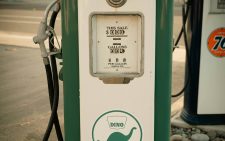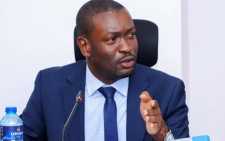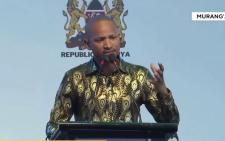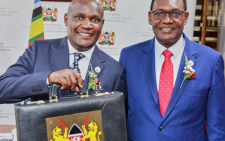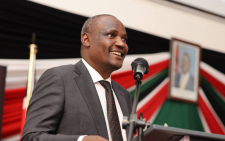Investors back EA oil pipeline amid climate activists’ protest

Major lenders, including African Export-Import Bank (Afreximbank), are backing Uganda’s East African Crude Oil Pipeline (EACOP) project while publicly supporting a just energy transition.
At last November’s United Nations Convention on Climate Change (COP29) in Baku, Azerbaijan, developing countries took wealthy, fossil fuel-producing nations to task over the energy transition and their failure to fulfil long-standing climate finance pledges.
However, just four months after the Baku climate summit, where Afreximbank executives promised to double down on their commitment to a just energy transition on the continent, they are singing a different tune.
The multilateral lender last week confirmed its support for the controversial EACOP oil pipeline project, which is planned to carry crude oil from Uganda to the Tanzanian coast for export overseas.
The pipeline was initially supposed to run through Kenya, but a deal between the Kenyan and Ugandan governments collapsed and Tanzania took over its 1,443-kilometre journey to its coast, where it will be put into ships bound for customers abroad.
EACOP is a joint venture between French multinational TotalEnergies, the China National Offshore Oil Corporation and the governments of Uganda and Tanzania. It plans to bring oil from Tilenga and Kingfisher oil fields near Uganda’s Lake Albert, down past Lake Victoria and all the way east through Tanzania to the Chongoleani Peninsula.
While the US$4 billion project promises economic growth and energy security for the region, it has sparked protests due to its negative environmental, economic and social impacts, which have been met by a crackdown on the part of the authorities in both Tanzania and Uganda.
East African climate activists have joined forces with their international counterparts in a strong campaign called #StopEACOP, arguing that the pipeline will exacerbate climate change by transporting 246,000 barrels of oil a day to customers to burn, releasing greenhouse gases.
They also warn that it will displace thousands of people and endanger water resources, wetlands, nature reserves and wildlife.
Shocking U-turn
The Ugandan government says that it has the right to exploit the country’s fossil fuel resources in order to fund much-needed economic development and is taking measures to reduce the project’s climate impact, such as heating the pipeline with solar energy. Wealthy nations like Australia, Canada and the US, meanwhile are also increasing fossil fuel production.
In the about-turn on their commitment to the just energy transition, it was announced last week that the Afreximbank, whose main shareholders are African governments, would be part of a syndicate of financial institutions committing a first tranche of external financing to the EACOP project, which is majority-controlled by French energy giant TotalEnergies.
Other lenders include South Africa’s Standard Bank, Uganda’s Stanbic Bank and KCB Bank, and Saudi Arabia’s Islamic Corporation for the Development of the Private Sector, according to a statement published by EACOP’s developer, which called the financing deal a “significant milestone”.
The loan is in the region of US$1 billion, with two further tranches expected, according to the government-owned Ugandan newspaper New Vision. Afreximbank earlier indicated it would provide $200 million to the project.
Samuel Okulony, CEO of the Environment Governance Institute, a Ugandan NGO, told the authoritative UK-based digital publication Climate Home News that Afreximbank’s actions are in direct contradiction of their “empty words” on climate change.
“Afreximbank is funding the destruction of our own people, while at the same time speaking about energy transition and a commitment to a cleaner future. It is a big disappointment,” he said.
Amid strong opposition, the 1,443km pipeline would carry crude oil extracted from oilfields under development near Lake Albert in Uganda to Tanga port for onward export to international markets. The long-delayed project has been the target of protests and lawsuits from campaigners that accuse the project developers of displacing communities, damaging the environment and fuelling the climate crisis.
A coalition of regional and society groups on Thursday told Climate Home News that the EACOP developer would announce financing for the project on a day many Ugandans had come face-to-face with the dire impacts of global warming.
This stark reality was evident on the front page of the state-owned New Vision newspaper, which published the EACOP announcement just above a picture of the deadly floods that are continuing to hit the capital Kampala.
The coalition said it is considering legal and “other” actions against financial institutions that continue to prioritise profits over the lives and well-being of East Africans.
Campaigners against EACOP said the project has already displaced thousands of people and stands to harm plants and animals, while also threatening livelihoods in the farming and tourism sectors.
The construction of the pipeline is a key element in Uganda’s push to become an oil producer, which the government says would propel the country’s economic growth.
The East African nation has been looking to exploit its natural resources for nearly two decades since oil reserves were discovered in the Albertine Rift Basin near the Democratic Republic of the Congo. But development stalled as the plans faced local opposition and the project struggled to attract external financing.
Western banks, including BNP Paribas, Société Générale, Barclays and Standard Chartered, have publicly stated their intention not to pour money into the project.
Uganda’s Energy Minister Ruth Nankabirwa, who has blamed activists for the project’s setbacks, said last September that at least seven European banks had committed, in private, to finance the project, the Financial Times reported – but no official announcement has materialised since then.
Afreximbank, Standard Bank, Stanbic Bank and Islamic Development Bank had all indicated their willingness to fund the pipeline construction in the past, while KCB Bank of Uganda is only being linked with the project now, reported Climate Home News.
Okulony said last week’s announcement amounted to a “desperate move” from the EACOP developer to demonstrate progress and drum up additional interest from investors in the project.
Contrasting commitments
He added that regional African banks are becoming lenders of last resort for the oil industry in the continent, covering up a gap left by the accelerating withdrawal of Western lenders. Afreximbank – whose main shareholders are the Egyptian and Nigerian governments – is a major backer of fossil fuel developments in Africa.
The lender’s exposure to the oil and gas sector increased in 2024, making up over a fifth of its total loans. It has bankrolled the expansion of oil production in Nigeria and the Republic of Congo, and last month it announced the intention to set up a US$1 billion financing facility for the fast-growing oil industry in Guyana.
The investments contrast with Afreximbank’s public attempts to bolster its climate credentials. At the COP29 climate summit, the lender said it would advocate for policies and investments that accelerate Africa’s energy transition and called for a scale-up in climate finance.
It’s president, Nigerian economist Benedict Oramah, stressed that the devastating impacts of climate change on the continent would probably intensify in the next decade.

